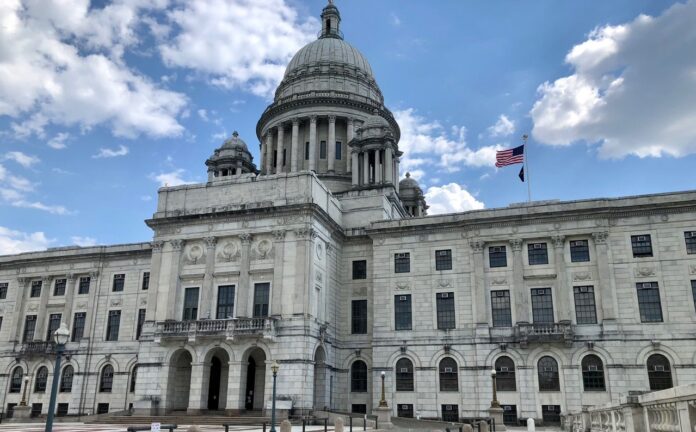
PROVIDENCE – Gov. Daniel J. McKee’s proposed $12.8 billion fiscal 2023 budget includes $431 million in federal American Rescue Plan Act funds for one-time spending and a multiyear plan for the rest of the state’s roughly $1 billion in uncommitted federal pandemic aid.
Despite the election-year timing of McKee’s proposals to commit all of the state’s ARPA funding, it makes economic sense to do so now, according to several observers who follow the state budget process. The state has until 2024 to commit the federal funding.
“It’s been 10 months since the money has been available, so one would expect that he would fully propose how to spend it all,” said Michael DiBiase, CEO and president of the Rhode Island Public Expenditure Council.
DiBiase told Providence Business News on Wednesday the budget plan that’s now being reviewed by the General Assembly is effective in appropriating ARPA funds for one-time expenditures. RIPEC was concerned that it would be allocated for continuing expenditures.
“In general he did not do that,” said DiBiase, who served as director of the Department of Administration from 2015 to 2020 and oversaw the budget process. “It’s kind of interesting that the governor included all of the federal funds in his proposal, programmed for six years, which I think is a good thing.”
In his budget statement, McKee wrote: “The ARPA funds provide an opportunity to repair the harms of the pandemic and build a better Rhode Island. As a one-time revenue source, we must avoid investing them in a way that will result in future obligations.” McKee is widely expected to join the gubernatorial race this year but has not formally announced his candidacy.
State Budget Officer Joseph Codega Jr. said $431 million of the original $1.1 billion ARPA allocation to the state is technically part of the governor’s proposed fiscal 2023 operating budget.
“However, all ARPA appropriations are requested as part of the discrete project line items, so they are all appropriated for specific purposes/projects and not comingled with existing agency line items,” he said.
DiBiase added that despite proposing hundreds of million of dollars in spending from ARPA and surplus funds, the governor’s budget plan overall is relatively fiscally conservative.
“There are no significant increases in taxes or fees, and there’s relatively little in the way of new programs or expansions,” he said. “So, the one-time ARPA and surplus funds were generally spent on one-time items.”
Gary Sasse, founding director of the Hassenfeld Institute for Public Leadership at Bryant University, says the governor’s proposals for allocating the ARPA funds appear to be reasonable choices.
Sasse said the commitment of $431 million in fiscal 2023 “correlates with one’s view of the magnitude of immediate need. For example, the state faces many issues around housing. Frontloading housing investments is an appropriate response if the projects represents sustainable investments, and not spending for short-term recurring projects.
“Given the amount of funds available, the logistics of undertaking major capital projects and recurring supply chain problems, a four-to-six-year program window is defensible as long as it is consistent with federal requirements,” he said.
Sasse noted that economic conditions could change, so allocating all available funding could be somewhat of a gamble. “Therefore, the ability to make program amendments to deal with emerging challenges needs to be managed,” he said.
Saul Kaplan, who led the state’s economic-development efforts under two past governors, agrees with McKee’s approach to putting the ARPA funds to work right away.
“These game-changing resources shouldn’t be squirreled away in a rainy day fund doled out over a lot of years to fill operating deficits,” he said. “I applaud the governor for proposing to put this money to work.”
Adam S. Myers, an associate professor of political science at Providence College, agrees that spending the ARPA funds now makes sense.
“Rhode Island is a bit behind on this, as most states have already spent much of the ARPA money,” he said.
Under the governor’s budget proposal, the plan to spend ARPA funding would be spread out over six years. His top priorities for use of the ARPA are housing, small businesses, public health, children, families and education, and economic-workforce development.
The General Assembly has already approved McKee’s proposal for allocating $119 million of the ARPA funds on Jan. 4, which went toward housing, small businesses and human services.
The governor’s plan calls for allocating the remaining ARPA funding as follows: $431 million for 2023, $279 million in 2024, $168 million in 2025, $43 million in 2026, and $15 million in 2027.
The proposed 2023 budget includes:
• $82 million for housing
• $78 million for aid to small businesses and impacted industries
• $76 million for public health
• $61 million for children, families and education
• $59 million for economic workforce development
• $38 million for behavioral health
• $23 million for climate change
• $14 million for public infrastructure and technology
“These are one-time funds,” said Brian M. Daniels, director of the R.I. Office of Management and Budget. “So, we need to make sure that we are making investments, but not creating a fiscal cliff, so that when the funds expire, we have to backfill with state revenue.”
Cassius Shuman is a PBN staff writer. Contact him at Shuman@PBN.com. You may also follow him on Twitter @CassiusShuman.













Priorities are upside down as usual. No sense in building housing if you don’t have the schools, infrastructure, and jobs to support the people living in what will wind up becoming taxpayer supported housing.
Make sure you can give them a good education and a good job before you give them a house. If you can’t, let them move someplace else.